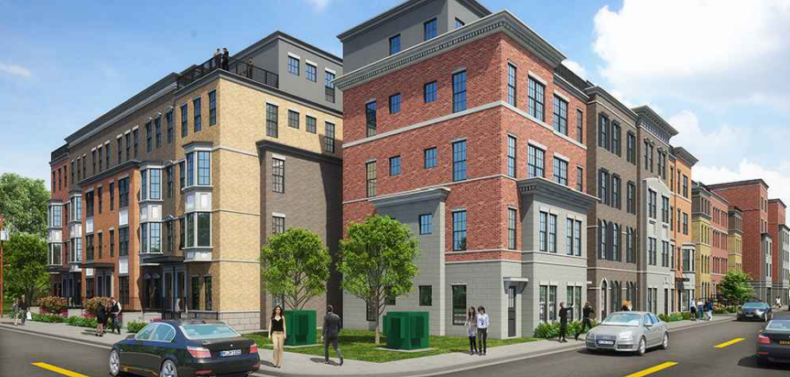The Athens-Clarke County Planning Commission sent on a proposed development behind the Bottleworks to the county commission with a unanimous recommendation for approval.
“We view this project as an expansion of the Bottleworks,” said Chris Evans, the project’s architect, whose firm is located at the Bottleworks. The development would consist of four apartment buildings surrounding a 244-space parking deck on the surface parking lot between Meigs and Newton streets and Hancock Avenue. The buildings would consist of 69 units, mainly two- and three-bedrooms, in five-story buildings with the top floor stepped back.
The development is meant for “a mix of people,” Evans said. “You’ll notice there’s no pool deck or golf simulator planned for the project,” he told planning commissioners at their July 7 meeting. “The goal is to deliver thoughtful dwellings for Prince Avenue and the businesses. The amenity is really downtown. The amenity is what’s around. That’s what we’re trying to encourage.”
Developers are seeking a waiver from a zoning code requirement for ground-floor commercial space downtown. The project does include 4,300 square feet of commercial space in the building facing the back of the Bottleworks, and other ground-floor residential units are “flex space” that could be converted into offices, Evans said.
Mark Wilson, who lives in the Bottleworks, said the residential tenants there support it. “The absolute last thing we want is another eight-story box that blots out the sun and has commercial [space] on the ground floor that we can’t fill,” he said.
Others raised concerns. “I feel like we could do more to make it more appealing to non-students,” said Hill Street resident Liz DeMarco. She asked to table the request to coordinate with the buyers of the Camak House next door.
Compton Jones, who lives in the nearby Cobbham Historic District, said the project clashes with the single-family neighborhood. “There is nothing historic about that design,” she said, adding that it won’t include enough parking for students—“because you are going to be catering to students”—leading to congestion in the neighborhood.
Evans responded to criticism about scale by noting that, because the parcel is zoned commercial-downtown, a developer could build a much larger, denser development by right, without asking for permission. The only issue really on the table was the ground-floor commercial waiver.
“Another developer could come in with a project that would have people picketing in the streets,” planning commissioner Matthew Hall said.
As for nixing the ground-floor retail space, “It sounds like everybody agrees that’s an improvement over a bunch of, you know, mac-and-cheese chains or whatever they put in student apartment buildings,” Hall said.
“The biggest thing I like is covering up a surface parking lot,” planning commissioner Alice Kinman said. “That is so important. For better or worse, this is zoned commercial downtown… It is meant to attract this kind of development.”
The planning commission unanimously approved staff’s recommendation to allow the waiver. Planners had originally been against the waiver, but Planning Director Brad Griffin said they changed their minds after other departments weighed in, saying the developers had addressed questions about water, sewer, fire access and other issues. The recommendation now goes to the ACC Commission at its Aug. 3 meeting.
Like what you just read? Support Flagpole by making a donation today. Every dollar you give helps fund our ongoing mission to provide Athens with quality, independent journalism.










